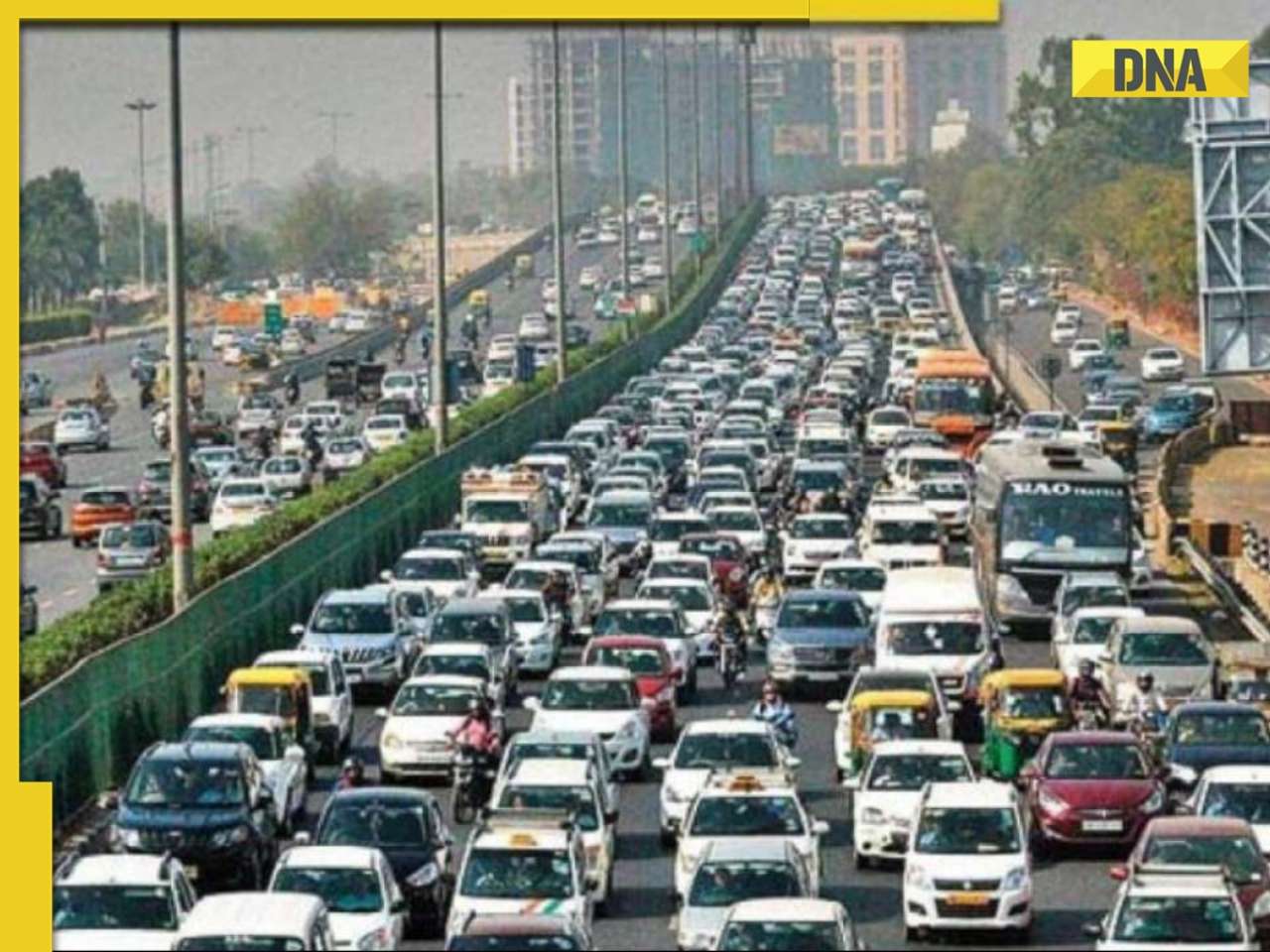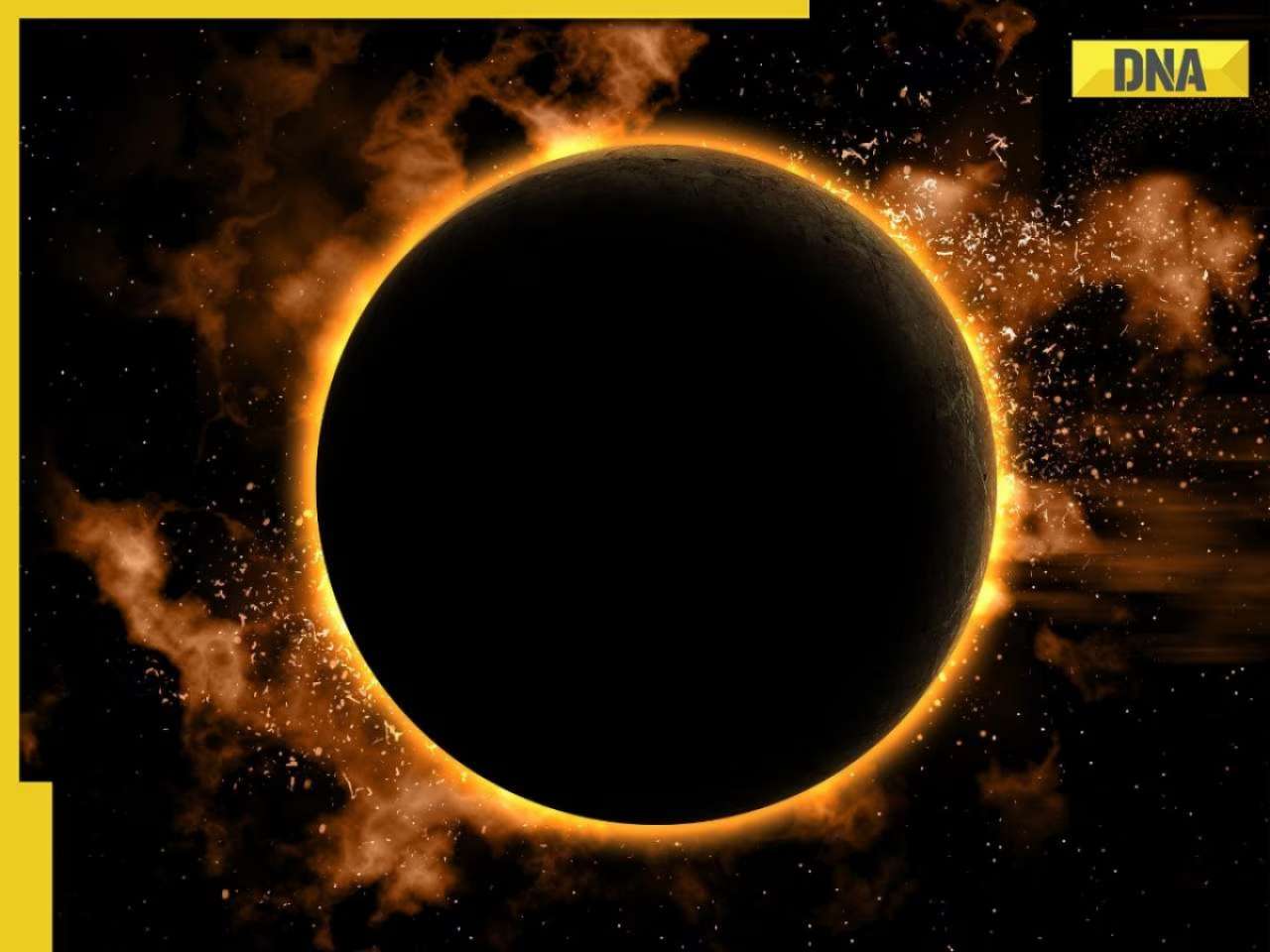There have been claims on social media that a total solar eclipse will take place on August 2. However, the claims are incorrect: United States' National Aeronautics and Space Administration has clarified that a total eclipse is due, but not this year. Read on to know more.
A solar eclipse is a rare celestial event in which the Moon passes between the Earth and the Sun.
There have been claims on social media that a total solar eclipse will take place on August 2. However, the claims are incorrect: United States' National Aeronautics and Space Administration (NASA) has clarified that a total eclipse is due, but not this year. The rare phenomenon will actually take place on August 2, 2027, and is being described as the "eclipse of the century."
What is a solar eclipse?
A solar eclipse is a rare celestial event in which the Moon passes between the Earth and the Sun, blocking the sunlight and casting a shadow on our planet. There are several types of solar eclipses, including total solar eclipse (such as the one on August 2, 2027), annual solar eclipse, partial solar eclipse, and hybrid solar eclipse. Researchers and scientists use solar eclipses to study the Sun's behaviour, while stargazers enjoy the scarce sightings. A total solar eclipse occurs when the Moon perfectly aligns to completely block the Sun. During this brief period, the sky darkens to the extent as if it were dawn or dusk.
Is there any solar eclipse in 2025?
According to NASA, the next solar eclipse will take place on September 21 this year. A partial solar eclipse, it will be visible in Australia, Antarctica, the Pacific Ocean, and the Atlantic Ocean. After that, an annular solar eclipse will occur on February 17, 2026. The total solar eclipse on August 2, 2027 will be visible in countries and regions such as British Indian Ocean Territory, Algeria, Egypt, Gibraltar, Libya, Morocco, Saudi Arabia, Somalia, Spain, Sudan, Tunisia, Yemen, and Afghanistan.
Find your daily dose of All
Latest News including
Sports News,
Entertainment News,
Lifestyle News, explainers & more. Stay updated, Stay informed-
Follow DNA on WhatsApp. Vikrant Massey dedicates National Award to marginalised people in society: 'A 20-year-old boy's dream has come true'
Vikrant Massey dedicates National Award to marginalised people in society: 'A 20-year-old boy's dream has come true' No India-Pakistan showdown at LA28? Olympic cricket qualification system casts doubts on fiercest rivalry
No India-Pakistan showdown at LA28? Olympic cricket qualification system casts doubts on fiercest rivalry Natasha Poonawalla stuns in leather blouse, modern saree fusion; see pics here
Natasha Poonawalla stuns in leather blouse, modern saree fusion; see pics here THIS consumer company earns profit of Rs 5,343,00,000,000, details here
THIS consumer company earns profit of Rs 5,343,00,000,000, details here SHOCKING! IndiGo passenger assaulted mid-air due to..., accused handed over to CISF
SHOCKING! IndiGo passenger assaulted mid-air due to..., accused handed over to CISF  Tata Harrier EV Review | Most Advanced Electric SUV from Tata?
Tata Harrier EV Review | Most Advanced Electric SUV from Tata? Vida VX2 Plus Electric Scooter Review: Range, Power & Real-World Ride Tested!
Vida VX2 Plus Electric Scooter Review: Range, Power & Real-World Ride Tested! MG M9 Electric Review | Luxury EV with Jet-Style Rear Seats! Pros & Cons
MG M9 Electric Review | Luxury EV with Jet-Style Rear Seats! Pros & Cons Iphone Fold: Apple’s iPhone Fold Could Solve Samsung’s Biggest Foldable Problem | Samsung Z Fold 7
Iphone Fold: Apple’s iPhone Fold Could Solve Samsung’s Biggest Foldable Problem | Samsung Z Fold 7 Trump News: Congress Seeks Answers On Trump's Alleged Mediation In Operation Sindoor
Trump News: Congress Seeks Answers On Trump's Alleged Mediation In Operation Sindoor THIS consumer company earns profit of Rs 5,343,00,000,000, details here
THIS consumer company earns profit of Rs 5,343,00,000,000, details here How may US tariff hit pharmaceuticals, smartphone, farm sectors of India? It may cause loss of ...
How may US tariff hit pharmaceuticals, smartphone, farm sectors of India? It may cause loss of ... Meet man who shut down his AI startup despite BIG funding, even Perplexity's Aravind Srinivas backed off due to...
Meet man who shut down his AI startup despite BIG funding, even Perplexity's Aravind Srinivas backed off due to... From Ratan Tata to Anand Mahindra: Indians who studied at Harvard, made country proud
From Ratan Tata to Anand Mahindra: Indians who studied at Harvard, made country proud Gautam Adani's Rs 219000 crore company's Q1 profit falls 16% to Rs...; the reason is...
Gautam Adani's Rs 219000 crore company's Q1 profit falls 16% to Rs...; the reason is... 12th Fail, Jawan, Animal, Ullozhukku, Parking, Sam Bahadur: Where to watch 71st National Awards 2025-winning films on OTT
12th Fail, Jawan, Animal, Ullozhukku, Parking, Sam Bahadur: Where to watch 71st National Awards 2025-winning films on OTT Meet Mrunal Thakur, TV actress who became a Bollywood star, now lives luxuriously, has swanky car collection, her net worth is...
Meet Mrunal Thakur, TV actress who became a Bollywood star, now lives luxuriously, has swanky car collection, her net worth is... From Ajay Devgan, Jaideep Ahlawat to Manoj Bajpayee: Meet India's highest-paid OTT actors
From Ajay Devgan, Jaideep Ahlawat to Manoj Bajpayee: Meet India's highest-paid OTT actors Kiara Advani Birthday Special: 5 ethnic looks that prove she’s true style icon
Kiara Advani Birthday Special: 5 ethnic looks that prove she’s true style icon Kiara Advani Birthday Special: Inside her glamorous life, from luxury cars to Rs 70 crore mansion
Kiara Advani Birthday Special: Inside her glamorous life, from luxury cars to Rs 70 crore mansion SHOCKING! IndiGo passenger assaulted mid-air due to..., accused handed over to CISF
SHOCKING! IndiGo passenger assaulted mid-air due to..., accused handed over to CISF  Muhammad Yunus' daughter funding secession of India to create 'Greater Bangladesh'? Is Turkey behind Saltanat-e-Bangla?
Muhammad Yunus' daughter funding secession of India to create 'Greater Bangladesh'? Is Turkey behind Saltanat-e-Bangla? Delhi News: Traffic movement on this key flyover to be suspended for 30 days from...; police issue advisory
Delhi News: Traffic movement on this key flyover to be suspended for 30 days from...; police issue advisory IPS Manish Kumar, IAS Ria Dabi's husband, gets new role of...; transferred to...
IPS Manish Kumar, IAS Ria Dabi's husband, gets new role of...; transferred to... After getting slapped with 25% tariff, India decides not to buy US-made F-35, know its cost and technical issues
After getting slapped with 25% tariff, India decides not to buy US-made F-35, know its cost and technical issues Meet woman, 3.5 feet tall IAS officer who was once made fun of, later graduated from DU, cracked UPSC exam on her first attempt, she is...
Meet woman, 3.5 feet tall IAS officer who was once made fun of, later graduated from DU, cracked UPSC exam on her first attempt, she is... CLAT 2026 Notification: Registration begins at consortiumofnlus.ac.in, check application process, eligibility,
CLAT 2026 Notification: Registration begins at consortiumofnlus.ac.in, check application process, eligibility, Meet Noida's first woman DM, Medha Roopam's husband, IIT grad, who cracked UPSC exam with AIR..., now posted as...
Meet Noida's first woman DM, Medha Roopam's husband, IIT grad, who cracked UPSC exam with AIR..., now posted as... IIM CAT 2025 Notification: Registration begins at iimcat.ac.in, check application process, eligibility, other details
IIM CAT 2025 Notification: Registration begins at iimcat.ac.in, check application process, eligibility, other details Meet one of Vikas Divyakirti’s favourite students, farmer's son who cracked UPSC twice, then became IAS officer in…, his name is…
Meet one of Vikas Divyakirti’s favourite students, farmer's son who cracked UPSC twice, then became IAS officer in…, his name is… Maruti Suzuki's e Vitara set to debut electric market at Rs..., with range of over 500 km, to launch on...
Maruti Suzuki's e Vitara set to debut electric market at Rs..., with range of over 500 km, to launch on... This is world’s most expensive wood, cost of 1kg wood is more than gold, its name is..., is found in...
This is world’s most expensive wood, cost of 1kg wood is more than gold, its name is..., is found in... This luxury car is first choice of Indians, even left BMW, Jaguar, Audi behind in sales, it is...
This luxury car is first choice of Indians, even left BMW, Jaguar, Audi behind in sales, it is... Kia India unveils Carens Clavis: Check features, design changes, price and more; bookings open on...
Kia India unveils Carens Clavis: Check features, design changes, price and more; bookings open on... Tesla CEO Elon Musk launches most affordable Cybertruck, but it costs Rs 830000 more than older version, it is worth Rs...
Tesla CEO Elon Musk launches most affordable Cybertruck, but it costs Rs 830000 more than older version, it is worth Rs...









)
)
)
)
)
)
)
)
)
)
)
)
)
)
)
)











